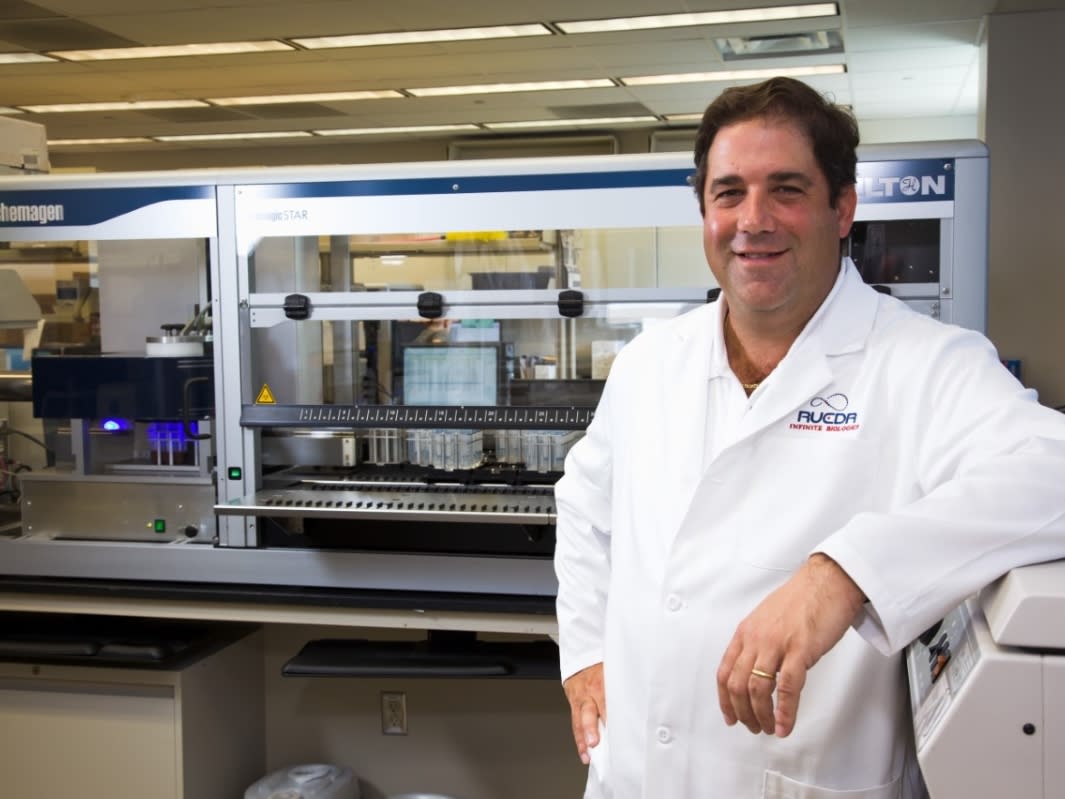Rutgers Scientist Who Invented COVID Spit Test Dies At 51

NEW BRUNSWICK, NJ — The man who helped invent the coronavirus saliva test, developed in a Piscataway lab affiliated with Rutgers University, has unexpectedly passed away.
The death of Andrew Brooks, 51, was announced by Gov. Phil Murphy in his coronavirus press conference on Monday.
Rutgers said his death was "unexpected" and that he died on Saturday.
"With a heavy heart, I want to acknowledge the tragic passing over the weekend of one of our state's unsung heroes, Dr. Andrew Brooks," said Gov. Murphy in a somber tone. "Born and raised in New Jersey, Dr. Brooks was a Rutgers University research professor in the department of genetics, and for the past decade he served as director of RUCDR Infinite Biologics.
"Now, you may remember that name. Why? Because last year, in the frenetic early days of the pandemic, he led the development of the so-called spit or saliva test."
That Rutgers spit test helped revolutionize COVID testing, and is now being used at testing sites across New Jersey. Because of Brooks' work, it became no longer necessary for testers to put a nasal swab high into one's nasal cavity, a painful and invasive experience. Instead, you could simply spit into a test tube and the saliva was then tested in a lab for the SARS-CoV-2 virus.
At the time, New Jersey Health Commissioner Judith Persichilli told NJ.com Brooks' test was "a game changer."
Brooks and his team developed the test in a lab at Rutgers' RUCDR Infinite Biologics, part of Rutgers' Human Genetics Institute of New Jersey. Their test was also unique in that results could be obtained within three days. At the time, it took up to 10 days to get coronavirus test results. (As testing technology progressed, results can now be obtained with 24 hours for the saliva test, and within minutes with rapid nasal cavity testing.)
Their work was based on a Nobel Prize-winning laboratory technique that used the virus' nucleic acid, in this case RNA.
After Brooks' test showed positive results, it received FDA emergency-use authorization in late March. As Patch reported, that same weekend Brooks and his team got an overnight call from the Trump White House, asking how quickly the test could go nationwide.
A month later, the spit test was the first of any test approved for home use.
"Since March, more than two million of these clinical tests have been performed, undoubtedly saving many lives and providing a practical tool for pandemic control," said Rutgers Chancellor Christopher Molloy in a statement. "The Rutgers University community is deeply saddened by the unexpected loss."
The Rutgers COVID spit test was first given to doctors and nurses at RWJ Barnabas Health and was then piloted on the general public at the Edison Motor Vehicle drive-through testing site. From there, it was picked up by the Visiting Nurse Association of Central Jersey Community Health Centers, and used in locations including Asbury Park, Freehold, Keyport and Red Bank and other state-run testing sites across New Jersey.
"They've worked quite well!" said Christopher Rinn, CEO of the Visiting Nurse Association of Central Jersey, said in this Patch interview in May. "Very easy to administer, great turnaround time, and effective in the sense they will increase access to testing. Saliva tests are less intrusive than the deep nasal swab, and are safer for healthcare workers administering the procedure. They require less personal protective equipment."
"When I realized I didn't have to have the swab jammed into my brain, I figured I'd give it a try," Edison resident Katrina Duggan, 41, told Patch in the same article, of why she preferred the spit test when she thought she had the virus.
"We at Rutgers offer our heartfelt condolences to Dr. Brooks’ family and we take pride in his achievements, which have contributed significantly to the effort to overcome this global pandemic," said Molloy.
"His test has undoubtedly saved lives, " agreed Murphy on Monday.
Brooks authored more than 70 scientific papers and served as an advisor to the Food & Drug Administration.
"He leaves behind a tremendous legacy at RUDCR, which over the summer he helped take private and is now known as Infinity Biologics LLC, with more than 550 employees," said the governor. "We cannot thank Andy enough for all he did. He was only 51 years old."
Brooks is survived by his mother, his sister and his wife and their three daughters.
Be the first to know what's happening in your town and area. Sign up to get Patch emails and don't miss a minute of local and state news: https://patch.com/subscribe
This article originally appeared on the New Brunswick Patch

